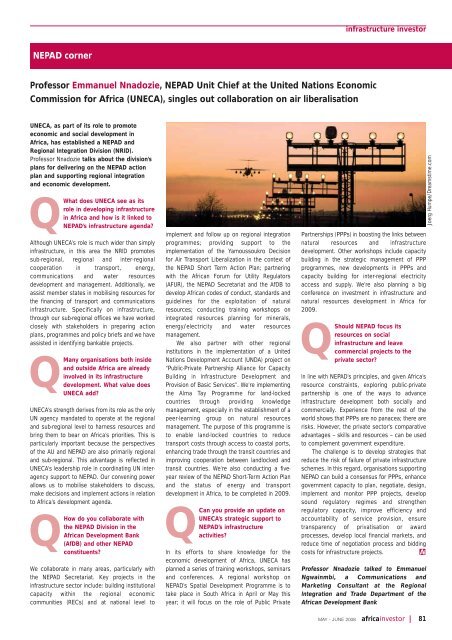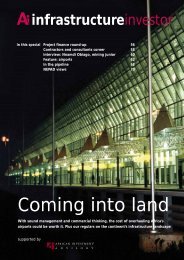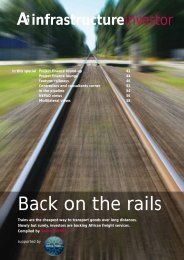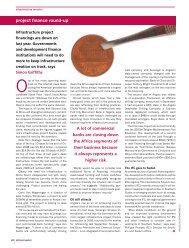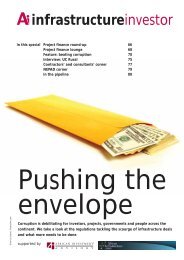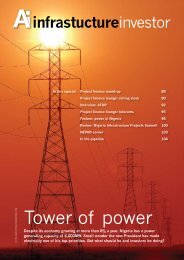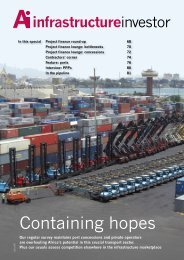Infrastructure investor May 2008 - Simon Griffiths
Infrastructure investor May 2008 - Simon Griffiths
Infrastructure investor May 2008 - Simon Griffiths
Create successful ePaper yourself
Turn your PDF publications into a flip-book with our unique Google optimized e-Paper software.
infrastructure <strong>investor</strong>NEPAD cornerProfessor Emmanuel Nnadozie, NEPAD Unit Chief at the United Nations EconomicCommission for Africa (UNECA), singles out collaboration on air liberalisationUNECA, as part of its role to promoteeconomic and social development inAfrica, has established a NEPAD andRegional Integration Division (NRID).Professor Nnadozie talks about the division’splans for delivering on the NEPAD actionplan and supporting regional integrationand economic development.QWhat does UNECA see as itsrole in developing infrastructurein Africa and how is it linked toNEPAD’s infrastructure agenda?Although UNECA’s role is much wider than simplyinfrastructure, in this area the NRID promotessub-regional, regional and inter-regionalcooperation in transport, energy,communications and water resourcesdevelopment and management. Additionally, weassist member states in mobilising resources forthe financing of transport and communicationsinfrastructure. Specifically on infrastructure,through our sub-regional offices we have workedclosely with stakeholders in preparing actionplans, programmes and policy briefs and we haveassisted in identifying bankable projects.QMany organisations both insideand outside Africa are alreadyinvolved in its infrastructuredevelopment. What value doesUNECA add?UNECA’s strength derives from its role as the onlyUN agency mandated to operate at the regionaland sub-regional level to harness resources andbring them to bear on Africa’s priorities. This isparticularly important because the perspectivesof the AU and NEPAD are also primarily regionaland sub-regional. This advantage is reflected inUNECA’s leadership role in coordinating UN interagencysupport to NEPAD. Our convening powerallows us to mobilise stakeholders to discuss,make decisions and implement actions in relationto Africa’s development agenda.QHow do you collaborate withthe NEPAD Division in theAfrican Development Bank(AfDB) and other NEPADconstituents?We collaborate in many areas, particularly withthe NEPAD Secretariat. Key projects in theinfrastructure sector include: building institutionalcapacity within the regional economiccommunities (RECs) and at national level toimplement and follow up on regional integrationprogrammes; providing support to theimplementation of the Yamoussoukro Decisionfor Air Transport Liberalization in the context ofthe NEPAD Short Term Action Plan; partneringwith the African Forum for Utility Regulators(AFUR), the NEPAD Secretariat and the AfDB todevelop African codes of conduct, standards andguidelines for the exploitation of naturalresources; conducting training workshops onintegrated resources planning for minerals,energy/electricity and water resourcesmanagement.We also partner with other regionalinstitutions in the implementation of a UnitedNations Development Account (UNDA) project on“Public-Private Partnership Alliance for CapacityBuilding in <strong>Infrastructure</strong> Development andProvision of Basic Services”. We’re implementingthe Alma Tay Programme for land-lockedcountries through providing knowledgemanagement, especially in the establishment of apeer-learning group on natural resourcesmanagement. The purpose of this programme isto enable land-locked countries to reducetransport costs through access to coastal ports,enhancing trade through the transit countries andimproving cooperation between landlocked andtransit countries. We’re also conducting a fiveyearreview of the NEPAD Short-Term Action Planand the status of energy and transportdevelopment in Africa, to be completed in 2009.QCan you provide an update onUNECA’s strategic support toNEPAD’s infrastructureactivities?In its efforts to share knowledge for theeconomic development of Africa, UNECA hasplanned a series of training workshops, seminarsand conferences. A regional workshop onNEPAD’s Spatial Development Programme is totake place in South Africa in April or <strong>May</strong> thisyear; it will focus on the role of Public PrivatePartnerships (PPPs) in boosting the links betweennatural resources and infrastructuredevelopment. Other workshops include capacitybuilding in the strategic management of PPPprogrammes, new developments in PPPs andcapacity building for inter-regional electricityaccess and supply. We’re also planning a bigconference on investment in infrastructure andnatural resources development in Africa for2009.QShould NEPAD focus itsresources on socialinfrastructure and leavecommercial projects to theprivate sector?In line with NEPAD’s principles, and given Africa’sresource constraints, exploring public-privatepartnership is one of the ways to advanceinfrastructure development both socially andcommercially. Experience from the rest of theworld shows that PPPs are no panacea; there arerisks. However, the private sector’s comparativeadvantages – skills and resources – can be usedto complement government expenditure.The challenge is to develop strategies thatreduce the risk of failure of private infrastructureschemes. In this regard, organisations supportingNEPAD can build a consensus for PPPs, enhancegovernment capacity to plan, negotiate, design,implement and monitor PPP projects, developsound regulatory regimes and strengthenregulatory capacity, improve efficiency andaccountability of service provision, ensuretransparency of privatisation or awardprocesses, develop local financial markets, andreduce time of negotiation process and biddingcosts for infrastructure projects.Professor Nnadozie talked to EmmanuelNgwainmbi, a Communications andMarketing Consultant at the RegionalIntegration and Trade Department of theAfrican Development BankJoerg Humpe/Dreamstime.comMAY - JUNE <strong>2008</strong> africa<strong>investor</strong> |81


